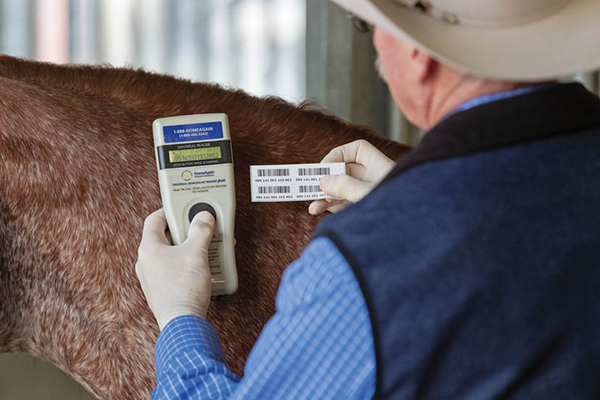AQHA Launches Microchip Pilot Program
Regardless of where you live or what you do with your American Quarter Horse, the advantages to implanting a microchip in your horse are readily seen. Now you have the opportunity to learn more about microchipping, get your horse microchipped and have that ID number added to his permanent record in AQHA’s database.
A microchip is about the size of a grain of rice and contains a 15-digit numerical code unique to that horse which can never be altered. The ID numbers are very much like an automobile’s VIN number and provide a reliable way to verify a horse’s identity. In horses, the microchip is implanted into the nuchal ligament in the neck, using a syringe-like device.
In 2018, the AQHA Studbook and Registration Committee recommended that the AQHA Executive Committee develop a business plan to implement microchipping as a chief means of effectively identifying American Quarter Horses. A task force appointed by the Executive Committee to study microchipping determined that microchipping creates consumer confidence, increases efficiencies, sustains membership and increases the value of a horse. The task force then recommended the AQHA Microchip Pilot Project, which was reviewed and approved by the Executive Committee in November, reviewed by the AQHA Studbook and Registration Committee at Convention, and launched the week of March 11 during the 2019 AQHA Convention.
“Microchipping improves consumer confidence and validates breed integrity,” said Dr. Tom Lenz, who is a strong advocate for animal welfare, biosecurity and livestock traceability. Dr. Lenz is the chairman of the 11-member microchip task force. “If a horse is ‘chipped,’ then you scan him and compare the chip number to the microchip ID number that’s on his registration certificate and know you’re dealing with the right horse.”
“Having horses microchipped can result in increased efficiencies in entering and checking in horses at shows and races,” Dr. Lenz added. “When you pull your trailer full of horses up to the check-in line, all the clerks have to do is scan each horse. Ideally, that scan will connect to a computer program that will pull up each horse’s records and show paperwork based on his microchip ID number.”
Even if you don’t show or race your horse, you can see benefits from microchipping, such as helping you recover your horse in case of natural disaster or theft. For example, since 1994, Louisiana has required that all horses be microchipped. The push was intended to eradicate equine infectious anemia, but in 2005, the state found another benefit to the microchips.
“After hurricanes Katrina and Rita in 2005, roughly 400 horses were displaced in Louisiana,” Dr. Lenz said. “Because authorities could scan those horses, they returned every horse to their owners except one.”
The 2019 microchip pilot project consists of reaching out to educate members, owners, breeders, trainers, show managers and others on the benefits of microchipping, and teaching how to properly microchip a horse. Voluntary microchipping of horses is encouraged as part of the pilot project, as AQHA has for a number of years been able to record a horse’s microchip ID on its registration certificate and in the Association’s database. More than 20,000 horses in the AQHA database have microchip IDs on their records. That’s equal to about half of 1 percent of the live population of American Quarter Horses.
Watch the video below to learn how to microchip your horse.
In the near future, you’ll be able to enter your horse’s microchip ID number using a module on AQHA’s website. Until that tool is available, you can contact AQHA Customer Care at 806-376-4811 to put your horse’s microchip ID number on its record.











